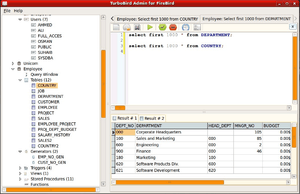Firebird (database server)
 | |
 | |
| Developer(s) | Firebird Project |
|---|---|
| Initial release | 2000 |
| Stable release | 2.5.5 / 19 November 2015 [1] |
| Preview release | 3.0 Release Candidate 1 / November 9, 2015[2] |
| Written in | C++ |
| Operating system | Cross-platform |
| Type | RDBMS |
| License | IPL, IDPL |
| Website |
www |
Firebird is an open source SQL relational database management system that runs on Linux, Microsoft Windows, Mac OS X and a variety of Unix. The database forked from Borland's open source edition of InterBase in 2000, but since Firebird 1.5 the code has been largely rewritten.[3]
History
Within a week of the InterBase 6.0 source being released by Borland on 25 July 2000,[4][5] the Firebird project was created on SourceForge.[6][7] Firebird 1.0 was released for Linux, Microsoft Windows and Mac OS X on 11 March 2002,[8] with ports to Solaris, FreeBSD 4, HP-UX following over the next two months.[9]
Work on porting the codebase from C to C++ began in 2000. On 23 February 2004, Firebird 1.5 was released,[10] which was the first stable release of the new codebase. Version 1.5 featured an improved query optimizer, SQL-92 conditional expressions, SQL:1999 savepoints and support for explicit locking.[11] Firebird 2.0 was released on 12 November 2006,[12] adding support for 64-bit architectures, tables nested in FROM clauses, and programmable lock timeouts in blocking transactions.[13]
The previous stable release was version 2.1.6, which added new features including procedural triggers, recursive queries, and support for SQL:2003 MERGE statements.[14]
Firebird 2.5.5 is the current stable version. New features included improved multithreading, regular expression syntax and the ability to query remote databases.[15]
Through the Google Summer of Code 2013 work has begun on integrating Firebird as an replacement for HSQLDB in LibreOffice.[16][17]
The planned 3.0 release is expected to support stored procedures in languages such as Java and C++, and SQL window functions that restrict query results. A first Beta version was released in November 2014.[18]
Mozilla Firefox name conflict
In April 2003, the Mozilla Organization announced to rename its web browser from Phoenix to Firebird after a trademark dispute with Phoenix Technologies.[19]
This decision caused concern within the Firebird database project due to the assumption that users and Internet search engines would be confused by a database and a web browser both using the name Firebird.[20][21] The Mozilla developers issued a statement,[22] making clear that their software package was called "Mozilla Firebird", not "Firebird".[23][24] The statement also said that the Mozilla Firebird name was a project codename.
The dispute was resolved on February 9, 2004, when Mozilla changed the name of its browser to Mozilla Firefox, thus ending the conflict.[25][26][27]
Main features
- Full support for stored procedures and triggers[28]
- Full ACID compliant transactions
- Referential integrity
- Multi Generational Architecture (sometimes called MVCC)[29]
- Support for External Functions (UDFs)
- SQL activity can send asynchronous notification events to clients
- Third-party tools, including GUI administrative tools and replication tools
- Careful writes - fast recovery, no need for transaction logs
- Many access methods: native/API, dbExpress/FireDAC[30] drivers, ODBC, OLE DB, .NET provider, JDBC native type 4 driver, Python module, PHP, Perl
- Incremental backups
- Full cursor implementation in PSQL
Storage and index technology
The Multi-Generational Architecture (MGA)
Firebird inherited the storage architecture of Interbase. To ensure the ACID properties of transactions, the database engine keeps different versions of each record changed by the active users in the database. When the transactions are committed, the last version of every changed record is marked as the definitive. If transactions are rolled back, the database engine keeps the mark on the original record versions, leaving them untouched.[31] As a result, Firebird disk writes are very reduced compared to databases that use the traditional transaction log architecture.[32] Writing transactions does not prevent reading and vice versa, because each one sees its own version of the database.[33] The tradeoff is that some maintenance (“sweeping”) is required from time to time to clean up old record versions and free disk space.[34]
The multi-generational architecture ensures that OLTP and DSS/OLAP operations can be run simultaneously without the delays caused by locking mechanisms found in other products.[35]
Indexes
Firebird makes all indices of the database behave like well-tuned “clustered indexes” used by other architectures. Firebird index buckets aren’t subject to two-phase locking, and boolean “and” and “or” operations can be performed on intermediate bitmaps at a negligible cost, eliminating the need for the optimizer to choose between alternative indexes.[36]
Variants
- Firebird SuperServer has a single daemon/server for all client connections, multithreaded with shared cache
- Firebird SuperClassic also has a single daemon/server for all client connections, multithreaded with separate caches
- Firebird Classic uses inetd to run one copy of the server per client connection, recommended for SMP systems but might have event-notification issues if access is via a firewall
- Firebird Embedded for creating CD-ROM catalogs, single user or evaluation versions of applications
Licensing
The Firebird database engine and its modules are released under an open-source license, the Initial Developer's Public License (IDPL), a variant of the Mozilla Public License (MPL) version 1.1. It does not require the developer to open the products using Firebird or even custom-derivatives made from its source code, but if the developer chooses to do so, then some terms and conditions should be honored. The IDPL allows the developer to make proprietary, closed-source applications that use Firebird or are based on it.[37]
Connectivity APIs
Low-level Firebird Native API, Services API and embedded SQL
The Firebird native API is used directly or indirectly by applications or middleware that connect to a Firebird database. It is implemented in the client library, fbclient.dll, on Windows systems, and in libfbclient.so on Unix ones. [38]
The Services API is a special function set for accessing and controlling service administration tasks such as user management, backup/restore and statistics gathering.
Embedded SQL is a technique that simplifies the development of C/C++ and COBOL Firebird applications, by using a preprocessor called gpre, which allows the embedding of SQL statements directly into the source code of the host language.[39]
Awards
- 2007. SourceForge Community Choice Award: Best Project for enterprise, Best user support.[40]
- 2009. SourceForge Community Choice Award: Best Project for enterprise. Finalist on Best Project and Best Project for Government.[41]
See also
- Firebird Foundation
- Comparison of relational database management systems
- List of relational database management systems
- Multiversion concurrency control
References
- ↑ "Firebird: Firebird 2.5.5 sub-release is available". FirebirdSQL. Firebird Foundation. 2015-11-19.
- ↑ "Firebird 3.0 Release Candidate 1 is available for testing". FirebirdSQL. Firebird Foundation. 2015-11-09. Retrieved 2015-11-09.
- ↑ "Firebird 1.5.5 Release Notes". Retrieved 29 September 2009. Firebird 1.5.5 General Notes for rewriting it from C to C++ language
- ↑ "Inprise/Borland Introduces InterBase 6.0 Now Free and Open Source on Linux, Windows, and Solaris". 16 July 2000. Archived from the original on 6 December 2004. Retrieved 29 January 2009.
- ↑ "Borland.com: Inprise/Borland Introduces Interbase 6.0 Now Free and Open Source on Linux". Linux Today. Retrieved 29 January 2009.
- ↑ "Firebird History". Retrieved 14 March 2014.
- ↑ Paul Reeves. "What's happening to InterBase". Borland User Group. p. 2. Retrieved 14 March 2014.
- ↑ "IBPhoenix Community News Archive". 11 March 2000. Retrieved 29 January 2009.
- ↑ "IBPhoenix Community News Archive". 11 April 2000. Retrieved 29 January 2009.
- ↑ "Firebird Relational Database 1.5 Final Out". Slashdot. 23 February 2004. Retrieved 31 January 2009.
- ↑ Helen Borrie (5 October 2009). "Firebird 1.5.6 Release Notes". Firebird Project. Retrieved 10 June 2012.
- ↑ Dmitry Yemanov. "Firebird 2.0 Final Release Launches in Prague". Retrieved 5 February 2009.
- ↑ Helen Borrie (5 April 2012). "Firebird 2.0.7 Release Notes". Retrieved 10 June 2012.
- ↑ Helen Borrie (20 July 2014). "Firebird 2.1 Release Notes". Retrieved 20 July 2014.
- ↑ Helen Borrie (19 November 2015). "Firebird 2.5.5 Release Notes". Retrieved 19 November 2015.
- ↑ mariuz (14 Feb 2012). "Firebird Embedded and LibreOffice is the killer combination to scale from a single file application to a client/server approach". Firebirdnews.org. Retrieved 8 July 2013.
- ↑ ahunt (28 May 2013). "GSOC 2013: LibreOffice Firebird SQL Connector". Retrieved 8 July 2013.
- ↑ "Firebird Roadmap". November 2014.
- ↑ Dotzler, Asa (April 14, 2003). "Phoenix and Minotaur to be renamed Firebird and Thunderbird". MozillaZine. MozillaZine. Retrieved January 29, 2016.
- ↑ Mozilla browser becomes Firebird, IBPhoenix, archived from the original on 2003-04-23, retrieved 2016-01-29
- ↑ Bishop, Alex (April 21, 2003). "Firebird Database Project Admin Ann Harrison Interviewed". MozillaZine. MozillaZine. Retrieved January 29, 2016.
- ↑ "mozilla branding". The Mozilla Organization. April 25, 2003. Archived from the original on April 26, 2003. Retrieved January 31, 2016.
- ↑ Festa, Paul (May 7, 2003). "Mozilla's Firebird gets wings clipped". CNET. CBS Interactive. Retrieved January 29, 2016.
- ↑ Bishop, Alex (May 14, 2003). "Christopher Blizzard of mozilla.org speaks on the Firebird naming conflict". MozillaZine. MozillaZine. Retrieved January 29, 2016.
- ↑ Paul Festa (February 9, 2004). "Mozilla holds 'fire' in naming fight". CNET. CBS Interactive. Retrieved January 29, 2016.
- ↑ "Mozilla Firebird Renamed Firefox, Version 0.8 Released". MozillaZine. MozillaZine. February 9, 2004. Retrieved January 29, 2016.
- ↑ "Mozilla Firefox - Brand Name Frequently Asked Questions". mozilla.org. Mozilla Foundation. Retrieved January 29, 2016.
- ↑ "Get to know Firebird in 2 minutes".
- ↑ Roman Rokytskyy. "A not-so-very technical discussion of Multi Version Concurrency Control". Retrieved 21 November 2011.
- ↑ "Connect to Firebird (FireDAC)".FireDAC
- ↑ "Multi-generational architecture (MGA) and record versioning". HK-Software. Retrieved 14 July 2011.
- ↑ "Interview with Jim Starkey from InterBase World". Marina Novikova, InterBase World. Retrieved 14 July 2011.
- ↑ "What is Multi Generational Architecture (MGA)?". The Firebird FAQ. Retrieved 14 July 2011.
- ↑ "Database Housekeeping And Garbage Collection". The Firebird Project. Retrieved 14 July 2011.
- ↑ "What is Multi Generational Architecture (MGA)?". The Firebird FAQ. Retrieved 14 July 2011.
- ↑ "Interview with Jim Starkey from InterBase World". Marina Novikova, InterBase World. Retrieved 14 July 2011.
- ↑ "Firebird: Initial Developer's Public License Version 1.0". Firebird Project. Retrieved 13 July 2011.
- ↑ "The Firebird client library". The Firebird Project. Retrieved 14 July 2011.
- ↑ "Application development". The Firebird Project. Retrieved 14 July 2011.
- ↑ "SourceForge.net 2007 Community Choice Awards Winners". SourceForge.net. Retrieved 13 July 2011.
- ↑ "SourceForge.net: 2009 CCA: Winners". SourceForge.net. Retrieved 13 July 2011.
External links
| Wikimedia Commons has media related to Firebird (database server). |
- Firebird - Project website
- Firebird - Developer portal
- Firebird collations, charts.
- Firebird documentation by IBProvider
- FirebirdFAQ